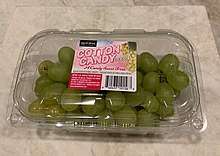International Fruit Genetics
International Fruit Genetics (IFG) is a private Bakersfield, California-based fruit breeding company. The company licenses patented breeds of fruit to growers worldwide, and is the largest private breeder of table grapes in the world.[2] Among its variety of table grapes is Cotton Candy grapes, which it licenses to Bakersfield-based grower Grapery.[3]
 | |
| Private | |
| Industry | Fruit breeding |
| Founded | 2001[1] |
| Founders | David Cain, Jack Pandol, Glen Stoller, Terrie Stoller, Craig Stoller |
| Headquarters | Bakersfield, California, United States |
Key people | Andy Higgins, CEO David Cain, Head of research |
| Products | Grape and cherry licensing, including Cotton Candy grapes |
| Website | ifg.world |
History
IFG was founded in 2001 in Bakersfield by David Cain, Jack Pandol, Glen Stoller, his wife Terrie Stoller, and their son Craig Stoller.[4][5] Cain was a fruit breeder who in the 1970s worked in Fresno, California as a researcher with the USDA, developing new varieties of table grapes and seedless raisins.[1] Pandol was a UC Davis plant scientist graduate and third generation grape grower who had founded grape growing company Grapery in 1996.[6] Glen and Terrie Stoller were the founders of Bakersfield-based grapevine nursery Sunridge Nurseries, a supplier of plant material to the wine and table grape industry, and their son Craig was the company's president.[7][8]
A few months after forming IFG, Cain attended a trade show where researchers from the University of Arkansas were showing grapes. One was a purple Concord grape that tasted sweet like cotton candy, but was fragile with tiny seeds. He licensed that grape along with others from the university for IFG, and improved the size and texture by crossbreeding the grapes with sturdier California grapes.[1]
In 2010, after years of cross-pollinating and testing numerous grapes, IFG patented the Cotton Candy grape, and began licensing it to growers.[1]
In 2011, the company had partnered with grape grower The Grapery, which was selling IFG's Sweet Sunshine, Sweet Sapphire and Sweet Celebration.[9]
In 2018, the company's Cheery Grand cherry, seen as a possible replacement for the Chelan cherry, began getting harvested in Chile and Australia.[2]
In July 2020, the company announced six new named varieties of table grapes, bringing their total to 40.[10]
Business
IFG invents, develops, and licenses proprietary hybrid fruit varieties in the United States and other countries. The varieties are patented, and IFG's income is derived from licensing the intellectual property rights in the plants it develops. When IFG develops a new variety of fruit, it applies for "plant variety rights" in countries where it wants to license the grapes. The license allows growers to grow and sell the fruits.[11]
In order to breed seedless grapes, the breeders have to take out the baby embryos from the plant, then grow them in individual test tubes in the lab before they can be planted. A new variety can take from six to fifteen years to create.[12]
Products

IFG breeds custom varieties of fruits including grapes and cherries, patents them and licenses them to growers. Their grapes come in red, black or green varieties.[13] The company's licensed products include its signature Cotton Candy grapes, and Sweet Celebration, a crunchy, cherry red, mid- to late-season seedless grape with a large berry.[1][4] Other shapes and flavors have names invoking sweet flavors.[14] As of July 2020, the company had developed 40 different varieties of grapes.[10]
Operations
IFG grapes are grown in the United States, Peru, Chile, Brazil and Mexico.[14] As of August 2018, the company's grapes were being sold in 14 countries.[15]
References
- "Fruit breeder hits the sweet spot with Cotton Candy grapes". latimes.com. 2013-07-31. Retrieved 2019-11-19.
- "Bakersfield breeder touts new cherry". capitalpress.com. 2019-02-05. Retrieved 2019-11-19.
- "Satisfy your sweet tooth with grapes that taste like candy". cbsnews.com. 2016-08-10. Retrieved 2019-11-19.
- "Grape breeding firm works on varietal development". thepacker.com. 2012-07-02. Retrieved 2019-11-19.
- "Jack Pandol: Carrying on the family tradition". issuu.com. 2011-10-28. Retrieved 2019-11-19.
- Smith, Anna (2018-01-05). "ANNA SMITH: A chat with a vineyard innovator: The man behind cotton candy grapes". bakersfield.com. Retrieved 2019-09-11.
- "Woman kicks off plan to save ag lands". bakersfield.com. 2006-02-10. Retrieved 2019-11-19.
- "Made in Kern County: Sunridge Nurseries". turnto23.com. 2018-10-25. Retrieved 2019-11-19.
- "Sweet Sunshine grape has successful first season". thepacker.com. 2011-05-17. Retrieved 2019-11-19.
- "IFG adds new varieties to table grape portfolio". Produce News. 2020-07-14. Retrieved 2020-07-16.
- "INTERNATIONAL FRUIT GENETICS, LLC v. P.E.R. ASSET MANAGEMENT TRUST". leagle.com. 2016-04-20. Retrieved 2019-11-19.
- "The Cotton Candy Grape: A Sweet Spin On Designer Fruit". npr.org. 2013-08-06. Retrieved 2019-11-19.
- "IFG grape varieties get PLU approval". fruitnet.com. 2018-05-18. Retrieved 2019-11-19.
- "International Fruit Genetics host field day open to public". kget.com. 2018-08-05. Retrieved 2019-11-19.
- "Cotton Candy grape stems from Arkansas". arkansasonline.com. 2017-09-10. Retrieved 2019-11-19.